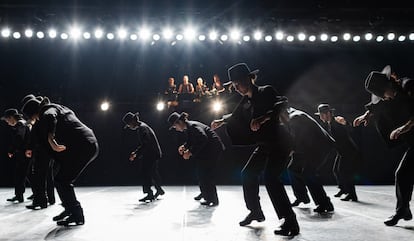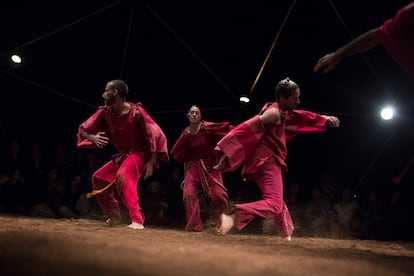Gaza War: Israeli contemporary dance disappears from international scene

“I briefly left the theater to smoke, and the police had to escort me,” choreographer and dancer Sharon Fridman speaks on the other end of the phone. At the time of this conversation, in mid-August, he is in South Korea presenting his work. “There is a group of protesters outside the theater, protesting because I am scheduled. They don’t know I am against Israeli policy. And like me, so many artists in my country are being canceled,” he continues.
Having lived in Spain for twenty years, Fridman confesses to being in the worst professional moment of his entire career. “They don't want to hire me because I'm Israeli. Some programmers tell you openly that it's better to wait a while; others don't, but it's not necessary,” he adds. “You feel like you have to justify yourself all the time. On the one hand, in Israel you fight against the war; I go to Tel Aviv every two months to see my mother and take the opportunity to protest. Outside of Israel, they look at you and treat you as if you were Netanyahu himself, and you feel afraid.” Fridman says that a few months ago, he took a stand against the Israeli government and the occupation of Gaza on his Instagram account and received horrible comments. Did he openly speak about genocide ? “No. Any Israeli who uses that word is in danger of dying,” he assures.
Fridman's case is not the only one in the boycott that Israeli dancers and choreographers have experienced since the occupation of Gaza, which has been described as a "genocide" by numerous historians and international agencies, including the International Association of Genocide Scholars. Dance, especially contemporary dance, is a highly supported discipline in Israel, with many internationally recognized artists, to the point that the discipline is considered domestically one of the country's great cultural ambassadors. But recently, many of these creators are seeing their once-thriving schedules drastically reduced.

The renowned Batsheva Dance Company, directed for many years by Ohad Naharin, currently associated with the company as a resident choreographer, has recently lost performances at La Villette (France), programmed by the Spanish artist Blanca Li before her resignation from the theater this summer, and at the Mexico City International Festival of Contemporary Dance (FIDCDMX), where it was scheduled to perform last August. A glance at the lineups of leading companies such as the Kibbutz Dance Company and the Vertigo Dance Company is enough to reveal the theatrical desert they face outside the State of Israel: not a single international venue in which to showcase their latest productions.
However, the same is not true for Israeli choreographers based in European countries such as England, in the case of Hofesh Shechter and Jasmin Vardimon, and France, where Sharon Eyal's company is based, and who are accumulating performances in various countries between now and December (Seville's Teatro de la Maestranza will host a work by choreographer Sharon Eyal next April). EL PAÍS has contacted them several times in recent weeks for the preparation of this report, but none, with the exception of Noa Wertheim, director of the Vertigo company, have responded to the request. Ohad Naharin and Jasmine Vardimon, initially willing to answer this newspaper's questions, ultimately declined.

In the case of Israeli-based groups, silence seems to be the way to maintain the support that the country's government has always professed for dance, a means of propaganda for Israeli politics for many, but one that also does not escape censorship: according to a news story in The Times of Israel on December 18, 2024, the Israeli Minister of Culture and Sports, Miki Zohar, threatened to withdraw funding from the Batsheva Dance Company for displaying a Palestinian flag in one of its performances. The work the minister was referring to is Anafaza , Naharin's 1993 creation, revived in 2023 for its thirtieth anniversary, in which this flag was flown alongside so many others. Months earlier, the same minister made statements about withholding state funding "for those who defame the State of Israel, both within the country and around the world." Even so, Naharin has been critical of and opposed to the genocide in Gaza in various interviews, although he declined to comment on this newspaper's comments. "When tens of thousands of civilians are dying, when hospitals, shelters, and aid centers are bombed again and again, we can no longer speak only of self-defense," he told the Walla website last August.
“I believe in communication,” Noa Wertheim, director of Vertigo Dance Company, says by phone from Jerusalem, “and when you go through difficult times like these, you have to talk, look each other in the eye if possible, and communicate.” And how is she experiencing this situation on an artistic and personal level? “With great sadness. It’s terrible to see all those people who are suffering and who can’t do anything to change things because they’re in the hands of crazy, extremist people. I try not to read the newspapers too much because I also feel the media is giving an inaccurate perspective.” Asked for her opinion on the cancellations of Israeli artists as a measure against her government, Wertheim is blunt: “I think it’s the most ridiculous way to show opposition to what’s happening because sometimes artists are boycotted who are even further to the left of those doing the boycotting. We’re being ignored everywhere, and it’s very sad and hard to see how you don’t exist to anyone.”
The avoidance of a clear stance against the genocide in Gaza by Israeli choreographers, both those working inside and outside of Israel, is what has led the organization Dancers for Palestine to spearhead one of the most powerful social media initiatives against dance originating in Israel, and specifically against the Batsheva Dance Company. They explain this in a video published on August 6 on their Instagram account, which also explains the origins of the Israeli government's interest in dance. This goes back to the 1960s, when American Martha Graham and Baroness Batsheva de Rothschild founded the prestigious Batsheva company in Tel Aviv. Back in 2007, this group, then directed by Ohad Naharin (who led it from 1990 to 2018), was an emblem of the Israeli brand in an international campaign.
On September 25, the young Israeli choreographer Adi Schwarz (Rakefet, 22) premieres the work Boys in the Sand at the Teatros del Canal in Madrid, the result of a residency awarded by the Canal Choreographic Center. “I haven't experienced any cancellations yet, but I know they can happen. Boycotting artists who defend peace doesn't help. Art should connect people, not separate them,” he explains to this newspaper.
The continued presence of Israeli choreographers on stage around the world, and the fervor of Tel Aviv's Suzanne Dellal Center (it shows more than 700 performances a year in performances alone), which in 2010 received the Israel Prize, the country's highest official award, contribute to this artistic discipline, based on body language without the need for translation, benefiting from significant government support. Even Orthodox Jews have their own contemporary dance company, the Jerusalem-based Kaet Ensemble. An all-male collective, some of them rabbis, it has visited Madrid's Teatro de la Abadía on two occasions . When the bombing began in October 2023, a group of Orthodox Jewish dancers traveled to southern Gaza to "make Israeli soldiers happy," according to the Swissinfo news site. “We have to be the best and we have to be the first,” Israeli choreographer Yair Vardi, who died in May, once declared, as reported on the Israeli government website.
EL PAÍS





%3Aformat(jpg)%3Aquality(99)%3Awatermark(f.elconfidencial.com%2Ffile%2Fbae%2Feea%2Ffde%2Fbaeeeafde1b3229287b0c008f7602058.png%2C0%2C275%2C1)%2Ff.elconfidencial.com%2Foriginal%2F256%2F4e6%2F2a9%2F2564e62a92567c0c73c7aaf63e7f55f6.jpg&w=3840&q=100)